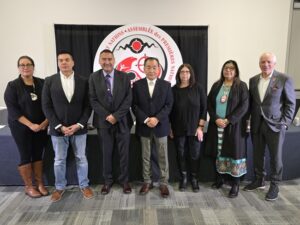Indigenous leaders call for equal and equitable community safety

By Rick Garrick
NETMIZAAGGAMIG NISHNAABEG — Netmizaaggamig Nishnaabeg Chief Louis Kwissiwa and other leaders recently called for the federal government to take action on community safety after Netmizaaggamig Nishnaabeg initially declared a state of emergency on Nov. 19.
“We need Canada to negotiate honourably and provide our communities with policing equal and equitable to what non-First Nations peoples enjoy today,” Chief Kwissiwa says. “We will not allow our community of Netmizaaggamig Nishnaabeg Unsurrendered to suffer because of Canada’s neglectful treatment. We can no longer afford to wait while lives are lost and our community lives in fear.”
Chief Kwissiwa gathered with other First Nation leaders and police service representatives on Dec. 5, 2024, in Ottawa to provide an update on the human rights complaint by the Indigenous Police Chiefs of Ontario (IPCO), which was launched in March 2023. The human rights complaint challenges decades of chronic underfunding of First Nations community safety under the First Nations and Inuit Policing Program. The upcoming three-week Canadian Human Rights Tribunal hearing is scheduled for Jan. 6-24, 2025.
“Canada is doing everything they can to avoid this hearing, even though it has been scheduled since May this year,” says Anishinabek Nation Grand Council Chief Linda Debassige. “Canada’s actions, while disappointing, are not surprising. The use of these procedural hurdles to prevent First Nations people from advocating for themselves is just another example of Canada’s dishonourable behaviour.”
Aundeck Omni Kaning Chief and tribal chair at the United Chiefs and Councils of Mnidoo Mnising Patsy Corbiere says First Nations community safety has suffered for too long.
“It is time for Canada to be accountable for their actions and let us have our day in court,” says Chief Corbiere. “Public Safety Canada needs to make good on its promise to First Nations that they deserve the same safety conditions as everyone else in this country.”
Anishinabek Police Service (APS) Chief of Police Jeff Skye says he sees firsthand the terrible consequences of Canada’s inaction.
“Our officers and civilian staff are asked to do more with less, and our community members suffer the consequences,” Skye says. “The drug crisis and gang infiltration of First Nations is real and it is here. Meanwhile, Canada tells us we can’t have the resources to address this crisis.”
Netmizaaggamig Nishnaabeg declared the state of emergency with the goal of protecting citizens from a crisis in violence, organized crime, addiction, and mental health.
“We are off the highway and the services for police, it takes them about 45 minutes to get to our community when a call is placed,” Chief Kwissiwa says. “There’s five (APS) police officers between both communities, (Netmizaaggamig Nishnaabeg and Biigtigong Nishnaabeg), and there’s next to no police services within our community. With the amount of crime and addictions going on, the state of our mental health within the community, all of our services are lacking and we do need adequate police services.”
Netmizaaggamig Nishnaabeg reached the decision to declare the state of emergency as a last resort after a young man was held at gunpoint and beaten, another individual was stabbed multiple times, and a home invasion took place involving armed offenders.
“Those are the types of crimes that are happening within the community,” Chief Kwissiwa says. “We thought about [declaring the state of emergency] before but we had to get a plan in place, and now we have a plan in place to go with the state of emergency. We’re not just calling on the provincial and federal governments to fix this for us, we’re asking them to assist us with fixing it. We know the issues in our community, we know what’s wrong and we know how to fix it, but we can’t do it without adequate police services, we can’t do it without adequate funding for mental health and addictions and especially police services.”
Chief Kwissiwa adds that the community has not received a substantial response from the provincial or federal governments as of Dec. 19.
“Today, we are bewildered to have still not received a substantial response from either level of government,” Chief Kwissiwa says. “As legislators go home for their holidays, many of our people feel like hostages in their own community and we continue to incur uncontrollable costs for security services. The time for dithering is over — we need action now.”
Meanwhile, the provincial government announced on Dec. 10 that the Nishnawbe Aski Police Service Board (NAPSB) would be the first-ever First Nations police service to come under the umbrella of the Community Safety and Policing Act, the province’s policing legislation. The province also announced a $514 million investment to support NAPSB as it opts-in to the provincial framework for policing. The funding would allow the Nishnawbe Aski Police Service to double the number of officers that serve 34 First Nation communities.
“This is a historic day for policing in the province of Ontario,” says Solicitor General Michael Kerzner. “We’re proud to mark this momentous occasion alongside First Nations partners to help modernize and strengthen the Nishnawbe Aski Police Service to keep communities safe and protected.”

